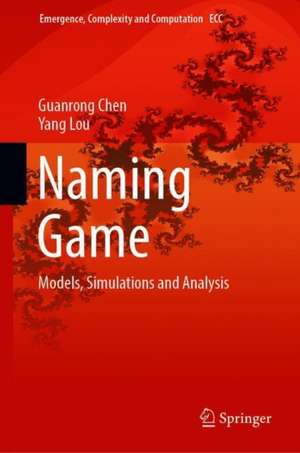Naming Game: Models, Simulations and Analysis: Emergence, Complexity and Computation, cartea 34
Autor Guanrong Chen, Yang Louen Limba Engleză Hardback – 17 dec 2018
Din seria Emergence, Complexity and Computation
- 8%
 Preț: 397.83 lei
Preț: 397.83 lei - 18%
 Preț: 1132.65 lei
Preț: 1132.65 lei - 18%
 Preț: 946.72 lei
Preț: 946.72 lei - 20%
 Preț: 651.75 lei
Preț: 651.75 lei - 20%
 Preț: 570.97 lei
Preț: 570.97 lei - 15%
 Preț: 653.33 lei
Preț: 653.33 lei - 15%
 Preț: 648.24 lei
Preț: 648.24 lei - 15%
 Preț: 651.19 lei
Preț: 651.19 lei - 20%
 Preț: 940.98 lei
Preț: 940.98 lei -
 Preț: 392.37 lei
Preț: 392.37 lei - 15%
 Preț: 647.59 lei
Preț: 647.59 lei - 15%
 Preț: 641.71 lei
Preț: 641.71 lei - 15%
 Preț: 645.28 lei
Preț: 645.28 lei - 15%
 Preț: 649.06 lei
Preț: 649.06 lei - 18%
 Preț: 1415.22 lei
Preț: 1415.22 lei - 20%
 Preț: 1304.44 lei
Preț: 1304.44 lei - 20%
 Preț: 1296.18 lei
Preț: 1296.18 lei - 20%
 Preț: 655.35 lei
Preț: 655.35 lei - 15%
 Preț: 648.56 lei
Preț: 648.56 lei - 18%
 Preț: 953.82 lei
Preț: 953.82 lei - 20%
 Preț: 657.02 lei
Preț: 657.02 lei - 18%
 Preț: 1117.03 lei
Preț: 1117.03 lei - 20%
 Preț: 992.26 lei
Preț: 992.26 lei - 15%
 Preț: 656.74 lei
Preț: 656.74 lei - 20%
 Preț: 649.60 lei
Preț: 649.60 lei - 15%
 Preț: 654.43 lei
Preț: 654.43 lei - 20%
 Preț: 661.14 lei
Preț: 661.14 lei - 20%
 Preț: 658.19 lei
Preț: 658.19 lei - 20%
 Preț: 644.15 lei
Preț: 644.15 lei - 18%
 Preț: 880.77 lei
Preț: 880.77 lei - 20%
 Preț: 1455.75 lei
Preț: 1455.75 lei - 20%
 Preț: 1158.26 lei
Preț: 1158.26 lei
Preț: 645.47 lei
Preț vechi: 806.83 lei
-20% Nou
Puncte Express: 968
Preț estimativ în valută:
123.52€ • 134.13$ • 103.76£
123.52€ • 134.13$ • 103.76£
Carte tipărită la comandă
Livrare economică 22 aprilie-06 mai
Preluare comenzi: 021 569.72.76
Specificații
ISBN-13: 9783030052423
ISBN-10: 3030052427
Pagini: 167
Ilustrații: IX, 158 p. 89 illus., 70 illus. in color.
Dimensiuni: 155 x 235 mm
Greutate: 0.42 kg
Ediția:1st ed. 2019
Editura: Springer International Publishing
Colecția Springer
Seria Emergence, Complexity and Computation
Locul publicării:Cham, Switzerland
ISBN-10: 3030052427
Pagini: 167
Ilustrații: IX, 158 p. 89 illus., 70 illus. in color.
Dimensiuni: 155 x 235 mm
Greutate: 0.42 kg
Ediția:1st ed. 2019
Editura: Springer International Publishing
Colecția Springer
Seria Emergence, Complexity and Computation
Locul publicării:Cham, Switzerland
Cuprins
Introduction.- Preliminaries.- Finite-Memory Naming Game.- Naming Game with Multi-Hearers or Group Discussions.- Communications with Learning Errors.
Recenzii
“Researchers who wish to reproduce the results presented in the book by their own computer codes might find this monograph very useful, as it is accompanied by several tables containing detailed information about the simulation settings and the numerical results, as well as a large number of plots about the outputs obtained by the authors in silico experiments.” (Gionni Marchetti, zbMATH 1512.91002, 2023)
“The audience for this book … interested in the naming game either as a starting point for their research or as a detailed guide to create independent simulations. For its intended audience, however, this monograph contains high quality information, clearly explained and well organized. Summing Up: Recommended. Graduate students, researchers, and professionals.” (L. Benedicenti, Choice, Vol. 56 (12), August, 2019)Textul de pe ultima copertă
This book provides a gradual introduction to the naming game, starting from the minimal naming game, where the agents have infinite memories (Chapter 2), before moving on to various new and advanced settings: the naming game with agents possessing finite-sized memories (Chapter 3); the naming game with group discussions (Chapter 4); the naming game with learning errors in communications (Chapter 5) ; the naming game on multi-community networks (Chapter 6) ; the naming game with multiple words or sentences (Chapter 7) ; and the naming game with multiple languages (Chapter 8). Presenting the authors’ own research findings and developments, the book provides a solid foundation for future advances. This self-study resource is intended for researchers, practitioners, graduate and undergraduate students in the fields of computer science, network science, linguistics, data engineering, statistical physics, social science and applied mathematics.
Caracteristici
Presents an introduction to various versions of the naming game Covers the minimal naming game where the agents have infinite or finite memory sizes, the naming game with group discussions, naming game with learning errors in communications, naming game on multi-community networks, naming game with multiple words or sentences, and the naming game with multiple languages Provides fundamental insights and a comprehensive understanding of the naming game and its applications in future social and language studies
